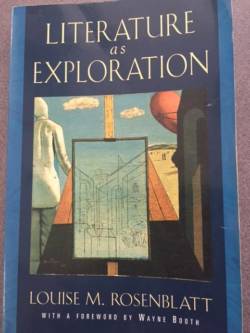Charlene Mendoza is both the principal and an AP English teacher at Arizona College Prep High School in Tucson, Arizona, and said that the book Literature as Exploration, first published in 1938 by professor Louise Rosenblatt, has been one of the most influential in her teaching. This book of literature theory, written for teachers, explores the idea of helping students engage with literature to develop empathy and understanding for the human experience, with the ultimate goal of becoming participatory citizens in our democracy.
Mendoza recently explained to MindShift why Literature in Exploration had such a big impact on her teaching, how in different years she’s highlighted the book in different colors, and how one book can help see the purpose of education in a whole new light. The conversation has been edited for clarity and length.
--------
My book is called Literature as Exploration. It’s an old book, strangely, originally published in 1938. The author is Louise Rosenblatt, she was a really interesting woman. She was working as part of a group of educators and college professors, along with John Dewey and people of that nature and time. I know this is a book that has impacted me significantly at many different times in my teaching career. The basic thought is that literature is transformative, and when we teach literature, we are creating an opportunity for kids to really imagine outside of their own lived experiences and develop empathy and understanding, which then becomes transformative to them individually and their ability to contribute in our democracy.
Sometimes theory books get really heavy, with thousands of notes and annotations, but this is really readable. Even though she was a college professor working with English teachers, she wrote it for teachers. Some of her chapters are titled things like, the “Challenge of Literature,” “Emotion and Reason,” “What the Student Brings to Literature.” Those are some of the chapters that have made a difference to me.



 And also this idea she has of -- she calls it a transaction, it’s an idea she uses throughout the book -- but really it’s the relationship that a text, a reader and the person who wrote the text engage in to create meaning. There’s a part of the book that has spoken to me beyond the literature part, that I call into my own work--my family and the [integrated] math class I started teaching, and that’s actually engaging with the text through transaction. Her famous quote is something like, ‘If all it is is squiggly lines in a book on a shelf, it doesn’t mean anything. It’s the individual students who must engage with that text in order for meaning and learning to happen.’
And also this idea she has of -- she calls it a transaction, it’s an idea she uses throughout the book -- but really it’s the relationship that a text, a reader and the person who wrote the text engage in to create meaning. There’s a part of the book that has spoken to me beyond the literature part, that I call into my own work--my family and the [integrated] math class I started teaching, and that’s actually engaging with the text through transaction. Her famous quote is something like, ‘If all it is is squiggly lines in a book on a shelf, it doesn’t mean anything. It’s the individual students who must engage with that text in order for meaning and learning to happen.’ 
